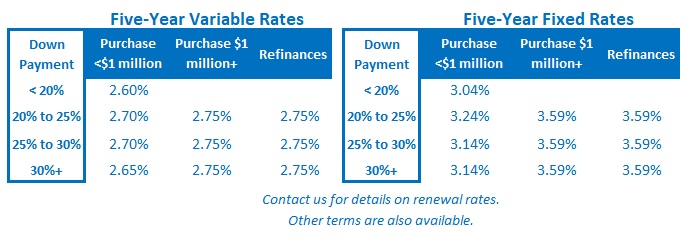Canadian Inflation Hits a Six-Year High
July 23, 2018Five Mortgage-Rate Related News Highlights from Last Week
August 7, 2018 Last week we learned that U.S. GDP grew by 4.1% on an annualized basis in the second quarter. This was an impressive surge for the U.S. economy, which has averaged GDP growth of about 2.2% over the past nine years.
Last week we learned that U.S. GDP grew by 4.1% on an annualized basis in the second quarter. This was an impressive surge for the U.S. economy, which has averaged GDP growth of about 2.2% over the past nine years.
Most economists believe that the U.S. economy has no room left for non-inflationary growth. If they’re right and U.S. inflation continues to accelerate, Canada will import that inflation through its extensive trade with the U.S., and that could compel the Bank of Canada (BoC) to accelerate its rate-hike timetable.
So the key question for anyone keeping an eye on Canadian mortgage rates is “Will this rise in U.S. GDP growth be sustained?”
Many market watchers think not, for the following reasons:
- Last quarter’s U.S. GDP growth was boosted by both tax cuts and increased stimulus spending by the U.S. federal government. These changes produced a short-term sugar high for the U.S. economy that will start to fade in the third quarter.
- U.S. President Trump’s trade-war talk led to a spike in exports as foreign companies ramped up their purchases of U.S. goods before newly announced retaliatory tariffs kicked in. For example, China announced a tariff on U.S. soybeans, and there was a big spike in soybean sales just prior to it taking effect.
- A rise in U.S. consumer spending helped contribute to second-quarter growth, but that rise corresponded with a decline in the U.S. saving rate and with surges in U.S. credit-card debt and non-revolving loans. While it’s true that debt-induced consumer spending may continue to boost growth for some time yet, it is still just bringing forward future demand, and at some point the piper must be paid. Furthermore, the carrying cost of this rapidly increasing consumer debt rises with every U.S. Federal Reserve rate hike.
- When all these one-time, short-term factors that are boosting U.S. GDP data are deducted, economists estimate that the U.S. economy only grew by about the same 2% rate that it has averaged for the better part of the past decade.
The second-quarter spike in U.S. GDP growth was largely foreseen by the BoC. In its latest Monetary Policy Report the Bank increased its U.S. GDP growth forecast for 2018 from 2.7% to 3.1%, but then lowered it from 2.7% to 2.5% in 2019 and from 2.0% to 1.8% in 2020. These adjusted forecasts reflect the BoC’s belief that U.S. tax cuts and deficit-financed stimulus spending are not sustainably increasing GDP but rather borrowing growth from the future.
While it may sound strange on first pass, I think last quarter’s surge in U.S. GDP growth may well hasten the arrival of the BoC’s next rate cut. Here is a breakdown of the factors that lead me to that view:
- The U.S. federal government’s decision to both cut taxes and increase stimulus spending at this point in the U.S. economic cycle is unprecedented. Normally, those measures are reserved for periods when an economy is in recession, not when it is operating at or near its full potential. While these initiatives are spurring short-term U.S. growth, they will also stoke the U.S. inflationary pressures that were already rising, and that is likely to force the Fed to accelerate its rate-hike timetable.
- The Fed has already increased its policy rate seven times in the last eighteen months and the U.S. treasury yield curve is close to inverting (which happens when short-term interest rates on U.S. government debt are higher than long-term rates). If the Fed is forced to continue hiking its policy rate to stave off inflationary pressures, the yield curve could invert some time in 2019, and an inverted yield curve is the most reliable recession predictor there is. Case in point, since 1955, the U.S. yield curve has inverted nine times, and in each case, a U.S. recession has followed.
- When the next U.S. recession hits, U.S. policy makers will have fewer weapons available to fight it. The U.S. federal government’s budget deficit has reached eye-watering levels and it has already cut taxes significantly, increasing the deficit even further. At the same time, the Fed’s policy rate is still only at 2%, leaving little room to reduce it, and its balance sheet is still bloated from past quantitative easing programs.
- If a U.S. recession occurs and the Fed cuts its policy rate in response, the BoC is likely to follow in short order. It would do this to offset the negative economic impacts from reduced U.S. demand and to keep the Loonie from appreciating against the Greenback.
Some of you may have spotted what looks like a contradiction in the points made above. Specifically, I speculate that if the Fed is compelled to raise its policy rate to stem inflationary pressures the BoC will not respond in kind, whereas if the Fed lowers its policy rate in response to recessionary headwinds, I argue that the BoC will match.
I don’t think that these views are, in fact, contradictory. If the Fed raises rates aggressively over the short term it will be in response to the U.S. federal government’s tax cuts and aggressive stimulus spending that fueled a spike in short-term GDP growth. Conversely, the Canadian federal government recently raised taxes and has not engaged in nearly as much stimulus spending. Not surprisingly, our short-term GDP growth has been much lower (a little less than 2% instead of 4.1%).
Given these important differences, if the Fed feels compelled to accelerate its rate-hike timetable that doesn’t mean that we should expect the BoC to respond in kind. I expect the Bank would instead by happy to let the Loonie weaken against the Greenback and to give our exporters a much needed tailwind to help offset trade uncertainty headwinds.
Conversely, if the U.S. economy falls into recession and the Fed starts to cut rates, I think the BoC will be much more likely to match in order to protect the Loonie from rising precipitously against the Greenback (which happened during the Great Recession and devastated large swaths our export sector when it did). Also, while the BoC repeatedly denies that it factors currency swings into its policy-rate decisions, I would refute that claim by noting that there is a long history of BoC actions that speak louder than its words on that topic.
The Bottom Line: It may seem strange to be predicting Fed and BoC policy-rate cuts in 2019, just as the headlines are touting a surge in second-quarter U.S. GDP growth. But for the reasons outlined above, I believe that the U.S. economy’s near-term growth is being caused by a short-term sugar high that will set in motion a chain of events that may very well lead to that outcome. If I’m right, any short-term upward pressure that we see on both our fixed and variable mortgage rates will dissipate, and reverse, in the not-too-distant future. Stay tuned.









6 Comments
Hi Dave!
I have been following your blog for sometime and find it interesting. Your detail analysis of both Canadian and US economy is very good. Hopefully the Variable rates will come down in 2019.
Thanks for your feedback Nikhil.
Best,
Dave
What a great article David. Unbelievable read
Thanks Mike.
Dave
Great article David. I always appreciate your detailed analysis which is also easy to read and understand.
Thank you.
Thanks for your note Rob.
Best,
Dave